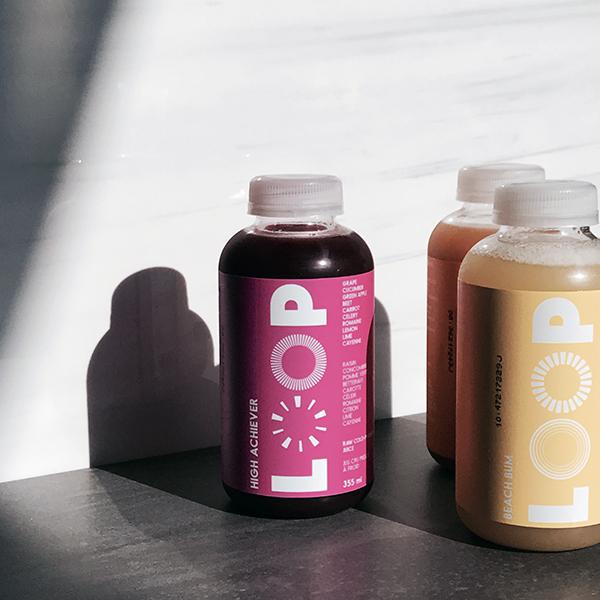These days, there’s no shortage of cold-pressed juice options in Toronto’s wellness scene. But one newcomer has found a way to stand out on increasingly crowded shelves: Loop, the environmentally aware Montreal-based juice maker on a mission to save perfectly nutritious produce from being squandered for no good reason.
“Founded last year, the company estimates it has already saved more than 407,000 kg of would-be-wasted fruits and vegetables.”
The company, whose brightly coloured concoctions hit Toronto this summer at places like Bond Running and Sweat & Soda, rescues the “outcasts” from a major produce distributor—basically, the fruits and vegetables that won’t sell at grocery stores because they look less than perfect. Ingredients like misshapen grapes, discoloured beets or undersized peppers are purchased at a low cost to make Loop’s seven signature blends.
That means the cold-pressed juices aren’t just gentler on the earth, but also our wallets: a 355 mL bottle of Loop will set you back $5 (versus the typical $8-$10 for a similar drink). Founded last year, the company estimates it has already saved more than 407,000 kg of would-be-wasted fruits and vegetables (and by extension, saved a staggering 268 million litres of water).
Loop is the brainchild of three founders with a shared passion for eliminating food waste: sustainable food expert Julie Poitras-Saulnier; restaurateur and raw food guru David Côté, who also co-founded Rise Kombucha; and Frédéric Monette, VP of operations and administration at Courchesne Larose, one of Canada’s largest produce distributors.
Together, this “rescue squad” set out to help solve Canada’s $31-billion-a-year food waste problem. “We’re the only ones we know who are doing this, especially in fruits and vegetables. It’s really surprising,” says president Poitras-Saulnier, noting that the issue of food waste isn’t even on the radar for most companies.
But for Loop, eliminating food waste is the number one priority. Even the pulp left over after juicing gets used: it goes to another local company to repurpose into vegan dog treats. Poitras-Saulnier says Loop is getting noticed by others around the world interested in mimicking the same business model. “We’re creating a movement,” she says. “We want to inspire a new way of doing things and connect businesses together, so the concept of waste doesn’t exist.”
After a successful inaugural year—you can already find Loop carried at 400 places (and counting)—more exciting things are on the horizon. Thanks to a $400,000 grant from the government organization Recyc-Québec, the company will be opening its own Green Factory within the produce distributor’s warehouse at the end of October.
That means the juice-making process will become even more efficient—and eco-friendly—because the company will no longer need to transport the fruits and vegetables elsewhere for production, says Poitras-Saulnier. “It’s going to be a real game-changer for us.”


If it is made with secondary fruits why does it cost MORE than regular fruit juice?